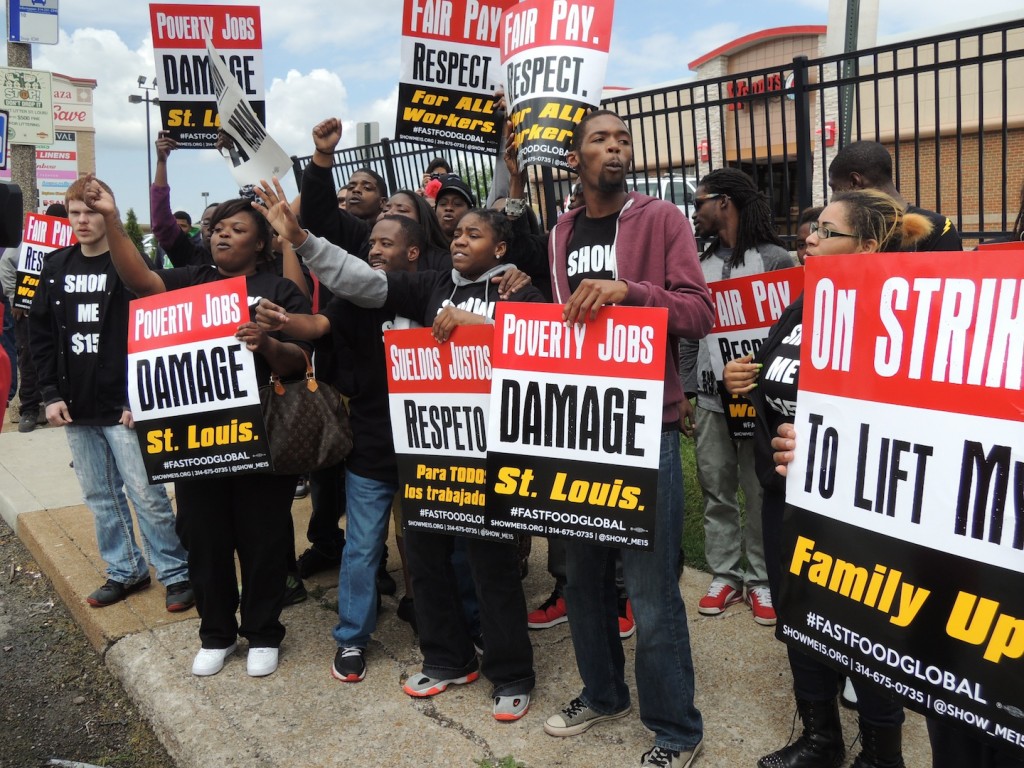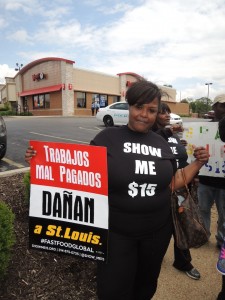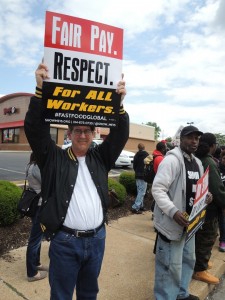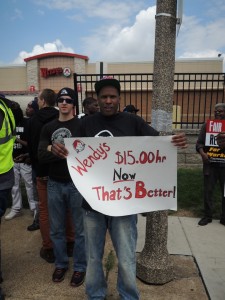Fast Food workers take it global
Strike in 150 U.S. cities; protests in 33 additional countries on 6 continents

– Labor Tribune photo
By TIM ROWDEN
Editor
Fast food workers supersized their demands for a living wage and the right to form a union without retaliation May 15, staging a series of walkouts in 150 American cities and protests in 30 additional countries, almost a year to the day after St. Louis fast food workers first went on strike for $15 an hour and a union.
Beginning a little bit before 6 a.m. fast food workers and community supporters with Show Me $15, the coalition of St. Louis area fast food workers, filed into the McDonald’s on W. Florissant Avenue chanting “Hey, hey, ho, ho, poverty wages have got to go”.
At noon, protesters arrived at the Wendy’s on Gravois, just in time to catch four Wendy’s workers walking out of the store. Once outside, the workers tossed their aprons and hats and picked up strike signs.

One of the workers, Marshelle Washington, 23, has spent the past six years working in fast food, at Popeye’s, Burger King, McDonald’s and now Wendy’s. She’s getting ready to leave Wendy’s for a better paying job in security, but decided to strike on behalf of other fast food workers, particularly her friends who have children.
SOCIAL AND ECONOMIC IMPACT
Washington says raising the minimum wage will do more than raise workers standard of living; it will effect social change.
“I will get people off the streets,” she said. “Because $7.50 is nothing. They can get that on the street sticking their hand out.”
Greg Meyer, 62, of St. Louis a retired teacher and member of the Missouri NEA, joined the workers in solidarity on the strike line.
Meyers said too many companies are hording cash and paying exorbitant salaries to CEOs, when increasing workers’ wages would help the entire economy.
“They have to get public assistance because they don’t make a decent wage,” Meyer said. “If you pay your workers a decent wage, they’ll spend that money.”

Basim Johnson, 29, works as a cook at the Burger King in Marlboro. After four years on the job, he’s still making only $7.50 an hour, averaging about $300 a week. His rent is $625 a month.
“Raising the wage,” he said, “would make a difference in my life.”
‘A FAIR WAGE’
“Our communities deserve jobs that pay workers enough to live on – $7.50 is just not enough,” said Dr. Reverend Martin Rafanan, co-chair of the Missouri Jobs with Justice and Community Director for Show Me $15. “We want good jobs that pay a fair wage. That’s what our families deserve, and that’s what will get the economy moving forward again.”
In addition to the St. Louis effort, workers went on strike last week at McDonald’s Burger King, Wendy’s and KFC restaurants from Raleigh to Los Angeles, including the first-ever fast-food strikes in Miami, Opelika (Ala.), Orlando, Philadelphia, Sacramento and San Antonio.
GROWING MOVEMENT
The campaign for higher pay and better working conditions started in New York City in November 2012, when 200 fast-food workers walked off their jobs demanding $15 and the right to form a union without retaliation.

Since then, the movement has spread to more than 150 cities in every region of the country – and now around the world.
The growing fight for $15 has been credited with elevating the debate around inequality in the U.S.
When Seattle’s mayor proposed a $15 minimum wage earlier this month, Businessweek said he was “adopting the rallying cry of fast-food workers.”
NOT JUST TEENAGERS
The movement is challenging fast food companies’ outdated notion that their workers are teenagers looking for pocket change.
Today’s workers are mothers and fathers struggling to raise children on wages that are too low. And they’re showing the industry that if it doesn’t raise pay, it will continue to be at the center of the national debate on what’s wrong with our economy.
WAGE THEFT AND DISPARITY
Earlier this year, workers in three states filed class-action suits against McDonald’s alleging widespread and systematic wage theft.
In a filing with the Securities and Exchange Commission, McDonald’s said worker protests might force it to raise wages this year.
A recent report by Demos, a public policy organization in New York, showed the industry has by far the largest disparity between worker and CEO pay.


Leave a Reply